|
0 Comments
Good morning!
Merry Christmas!
When we meet in person, we share our joys and concerns with each other. If you have prayer requests to share, you can add them to the comments on this post. When you are ready, use this prayer to get started.
Heavenly Father, this morning we pause to remember your goodness. We feel so needy oftentimes, and we do have needs. But help us to remember today that our deepest needs cannot be met through our own work or by our own strength, but only by your grace and what you have done in Christ. Especially during this season, we remember that you have filled us with good things, and today we choose to focus on what we have in you and not on what we lack.
We pray this in the name of Jesus Christ, our savior. Amen.
Today's lesson is on Luke 1:46-55.
Introduction
Politicians and musicians today often elevate themselves. Maybe they always did, but now they seem to brag blatantly and unapologetically. They love to hear their own names spoken in the news or in their own songs, and they often talk about their lavish lifestyles and show off their wealth. But there was a time not long ago when that kind of talk would have been considered rude and even pathetic. For some, even today, it is much better to understand that, if we have a lot of wealth or success, it is because God has given us the ability to attain those things and to know that wealth and success they carry with them the responsibility to use our gifts wisely. It better to realize that all of it is fleeting and, like our health and life itself, it will not last forever. It is better to understand that there are much deeper and more important aspects to life, such as our spiritual purpose and our connection to God. And when we have that — along with enough to sustain our lives each day — we truly have riches that will last. And that gives us joy and a reason to sing songs of praise.
Background
Of the two gospels that include the story of Jesus’s birth — Matthew and Luke — Luke tells the story more from the perspective of Mary, a young and powerless maiden. In fact, Luke’s emphasis is constantly on those who are poor or powerless and how Jesus’s life impacts them and elevates them. In Luke 4, for example, Jesus lays out his mission statement in a brief sermon in which he quotes Isaiah. He says that he has been anointed to proclaim good news to the poor, freedom for prisoners, the restoration of sight to the blind and freedom for the oppressed. In his sermon in chapter 6, he says the poor are blessed (not the poor “in spirit”) because the kingdom of God belongs to them. In chapter 8, he heals a poor woman who had a bleeding condition for 12 years, which would have meant her inability to make a living and her exclusion from society. In chapter 18, he tells a rich ruler that, to inherit eternal life, he must sell all of his possessions and give the money to the poor. But the man cannot do it because his money was more important to him and therefore was an idol. The list could go on. Just before our passage for today, the angel Gabriel appears to Mary and proclaims that she is “highly favored.” He says, even though she is a virgin, she will become pregnant and will have a son who would be called “the Son of the Most High” and would someday rule as king. Although Mary questions how this will happen, she submits to God’s will. Then Mary visits her relative Elizabeth, and she blesses Mary because Mary believed God’s promise. Mary responds with a statement that is our lesson for today. It is really a song similar in theme to the prayer of Hannah in 1 Samuel 2:1-10. In that prayer, Hannah also rejoices in God’s power and God’s care for the poor.
Worshipping the Almighty (verses 46-50)
Mary begins her song by saying that her soul — that invisible essence of a person that continues even beyond death — glorifies the Lord. She is basing her praise on her belief that God’s promise is true, supported only by the angel’s message and Elizabeth’s blessing. Mary cannot know at this point how God will work through the child. All she understands right now is that she, a humble woman, has been chosen for an important part of God’s plan. And that fact alone makes this a moment worthy of praising and thanking God. Next Mary gives the explicit reason for her praise. God has seen her humble place and still regards her with great favor. Mary is a young, unmarried and pregnant woman at this point. She comes from a little-regarded city and is part of a people that has historically lived under foreign rule. In fact, they are under Roman rule right now. In short, Mary is among the most insignificant people of the world. And yet, Mary is humble and obedient and available to whatever God calls her to do. That attitude of humility is a requirement for all people who want to be able to hear God’s call. And when they do, God promises to lift them up and to give them grace. (James 4:6) Mary says that future generations will call her blessed, not because of what she accomplished but because of what God accomplished through her. Throughout scripture, God accomplishes great things through people who are willing to trust God and to do what God calls them to do, despite their seeming lack of power. We think of Joshua, David, Ruth and Mary, to name a few. As the lives of these biblical figures attest, as well as the many saints we ourselves have known, in every generation God works through those who regard him with awe and who follow his commands.
The Work of the Almighty (verses 51-55)
Using anthropomorphic language, Mary sings of how God has always acted to lift up the lowly and to put down the proud. God’s so-called “arms” are strong. God is mighty, and God knows the pride we hold even in our innermost selves. Pride is often called the greatest sin because it elevates the person to the position that only God should have. All of us can suffer from this sin, but it especially tempting for those who have power or wealth or gifts that seem to raise them above others, at least in the minds of many. But God eventually gets the final word. Eventually all of these gifts fade away, and as we get older they become less important. Only then, if ever, do some see the folly of their thinking. And yet, the same God that brings down prideful rulers also cares for the poor and recognizes the value of a humble person who is willing and obedient. Mary experienced that truth first-hand, and so she sang God’s praises. Mary’s song says that God “has filled the hungry with good things but has sent the rich away empty.“ What does she mean by that? Is that always true? People still experience hunger and poverty today. So the “good things” are not necessarily always food and physical things. Maybe she is referring to things that are even more satisfying ultimately. One blogger writes this: “Mary’s theology impresses me. Without twelve years of school, Bible college, or seminary, she expresses profound truths. I am especially drawn to her words: ‘he has filled the hungry with good things.’ A quick look at the original language tells me that the hungry could also be translated 'the needy.’ That’s me. And good things mean ‘pleasant, useful, upright, and pleasurable’ things. I want those too. “In other words, Mary teaches me anew that my God is good, and he gives to me that which benefits me, even if it also brings pain. Mary’s ‘good thing’ brought about the cross. What was painful for her produced the best of all good things—the salvation of the world.” The Sunday school lesson notes that this is a warning for the rich who turn away from the needy and hungry and focus only on accumulating wealth. God’s kingdom does not make room for such selfish and prideful people. It also asserts that the song looks forward to a day when the hungry will be filled and will hunger no more. Mary’s song ends with a reference to God’s care for Israel over the course of history. Despite pain and trials and even the people’s disobedience, God is ultimately merciful to his servant Israel, and God never forgets his covenant. This moment is another step in that salvation history. The song’s conclusion invites its audience to imagine the scope of God’s work of salvation and the resulting blessing for all people. Though Mary was considered lowly in the world’s regard, God would use her to give birth to the Christ, the actual send through whom salvation came.
Conclusion
On special occasions like birthdays, anniversaries and holidays, we may take a moment to consider our blessings and achievements. However, this practice runs the risk of becoming an opportunity for self-exaltation; we might make God’s gifts sound like something we achieved by our own strength. Today’s scripture reminds us of the futility of self-exaltation. God will choose whom he wants to work through, regardless of the world’s perception of that person. Further, today’s scripture also warns of what can happen when people are driven by pride and selfish desires. God will inevitably humble people who exalt themselves. If we seek salvation through our power, wealth or acclaim, God will remove us from those positions. Self-exaltation will not lead to salvation. In fact, it will lead a person to emptiness and an existence without God’s salvation. We have a choice.
Prayer
Mighty God, just as you worked in your people throughout history, we ask that you do a mighty work in us. Show us how we might better proclaim your salvation. Fill us with humility so that we can be attentive to you. In the name of Jesus. Amen.
Benediction
This week's benediction is from the New King James Version.
Next week's lesson will be on 2 Chronicles 7:12-22.
This week's guest speaker is Rev. Renny Domske.
Fourth Sunday of Advent
Prelude Music Director Bob Senay ANNOUNCEMENTS: Advent candle lighters; Debbie Durila and Grandsons CALL TO WORSHIP: While shepherds kept watching O’er silent flocks by night. Behold throughout the heavens There shone a holy light. Go, tell it on the mountain Over the hills and everywhere. Go, tell on the mountain That Jesus Christ is born! The Shepherds feared and trembled When lo! Above the earth, Rang out the angel chorus That hailed our Savior’s birth. Go, tell it on the mountain Over the hills and everywhere. Go, tell it on the mountain That Jesus Christ is born! Down in a lowly manger The humble Christ was born, And God sent us salvation That blessed Christmas morn. Go, tell it on the mountain Over the hills and everywhere. Go, tell it on the mountain That Jesus Christ is born!
INVOCATION; Dr. Domske
* Hymn While Shepherds Watched Their Flocks #118 PRAYER OF CONFESSION: (unison) Our Father in Heaven, as we draw closer to the holy night of Christmas, we are afraid to compare ourselves to Mary, Joseph, And the Christ Child. They are so pure, but we are so selfish. They appear to us sinless, while we are full of sin. Take our sins away, Lord. Wash us clean and pure. We are sorry we have approached life selfishly. We are sorry we have sinned. We want to be Your sons and daughters as You made us to be. Wash our sins away in the Christ Child’s Name. * Time of silent prayer *ASSURANCE OF PARDON L: The peace of the Lord Jesus Christ be with you. P: And also, with you! Response – Gloria Patri (page 581) Passing the Peace Children’s Chat Prayer for Illumination Scripture reading: Isaiah 25: 1 – 8 Luke 2: 8 – 14 Sermon: “You Wouldn’t Believe What Happened At Work” *Hymn “It Came Upon the Midnight Clear” #123 *Apostles Creed (copy next to prayer list) Presentation of our tithes and offering Offertory Bob Senay *Doxology (page 606) *Prayer of dedication Concerns and Celebrations Prayers of the People The Lord’s Prayer *Hymn “Hark! The Herald Angels Sing” #119 *Benediction * Postlude
BIRTHDAYS: Jean Westfall, Bryan Bell, Buc Walther, John O’Hara, Cris Miller, Lyndon Herschell, Tom Miller, Jr.
ANNIVERSARIES: Mike & Debbie Durila SYMPATHY: To the Family of Larry Fox (Christine Welling’s Uncle) ANNOUNCEMENTS: Remember our Food Collection. And Jesus said,“You give them something to eat.” Please let Betty Fisher know of anyone within the community that may be in need at this time. Mt. Pleasant Presbyterian Church on Meyers Road near Washington will hold its traditional hymn sing at 7 p.m. Wednesday, December 21st . There will be scripture readings and stories as well as a time of fellowship and refreshments following the hymn singing. Don’t forget the mitten tree this year. You can also put socks, gloves, hats, or anything for the little ones to help keep them warm. Also don’t forget our Christmas Eve program is Saturday 24th at 7 p.m.
CONTINUING PRAYER LIST
Melissa Pedigo, Aaron Blake, Chuck Dicks, Tim Knabenshue, Frank Huffman, Tom Westfall, Elaine Belcascro, Sandy Stone, Matt Petrola, Nancy Hepinger, Ed Horne, Sarah Wilson, Bill Poland, Carl Weber, Jimmy Svetz, Betty Fisher, Haley Diedier, Fred Wilkinson, Evelyn Wood, Brandon Bell, Ricci Amos, Milton Rice, Nancy Diaz, Gianna Perry, Marlene McFeely, Tiffany Cipoletti, Robert Paxton, Bill Berdine, Cheryl Bell, Frank Baker, Diane Anderson, Jim Durila, James O’Hara, Barb and John O’Hara, Larry Litman, Sue Gregg, Doris Ann Rowe, Susan Strope, Tim Taylor, Helen Provenzano, Suzy Smith, Lori Doxtator Walker, Jean and Ron Westfall
We had lots of fun at yesterday's Christmas party!
Good morning!
We're so happy you chose to join us for the fourth Sunday of Advent!
Next Sunday will be Christmas! We plan to meet with whoever wants to come, read some selections together from the Christmas Ideals, and sing some carols.
When we meet in person, we share any joys or concerns from the past week. Consider your past week, and any prayer requests you may have. If you would like, you can share them in the comments. When you are ready, use the prayer below, from Sarah Martin, to get started.
Father, just as You sent John the Baptist to prepare the way for Jesus, help me to clear the path in my heart, too. Show me the distractions that block me from the worship of You this Advent. Lord, I await Your coming! As I celebrate the first Advent––the first coming––I look toward the day when I will see You face to face. I imagine what it will be like. Give me a heart, Lord, that looks for Your coming on a daily basis. Help me to live my life where I'm constantly seeking Your presence. My offering to You today is my righteous life for I know I am only clean because of Jesus. Show me how I must be refined, purified, and forgiven today. Give me the strength to ask for forgiveness and then change my ways. Amen
Today's lesson is on Luke 3:2b-6, 15-18. The other three gospels also tell the story of John the Baptist -- Matthew 3:1-12, Mark 1:1-8, and John 1:19-34; 3:22-36.
Lesson Context
John the Baptist came as the last prophet of Israel. The gospels describe him and his preaching as coming in the type of the prophet Elijah. Elijah was a prophet in the Old Testament who preached repentance mostly to the people in the northern kingdom of Israel. John the Baptist spent his formative years in the wilderness. Our book says some New Testament scholars propose that while in the wilderness, he may have been influenced by a Jewish sect called the Essenes. The members of this sect moved away from others, and lived in what we might think of as a monastic community. In their writings, primarily from the Dead Sea Scrolls, they seem to have been interested in preparing for the coming Messiah, and for the imminent end of the age. However, the Essenes were not mentioned in the New Testament. We read about John's birth in last week's lesson. After a break, Luke reintroduces John. His public ministry began during the fifteenth year of Tiberius Caesar's reign as Roman emperor (reigned 14 - 37 CE), probably 28 or 29 CE. Pontius Pilate was the governor of Judea. Herod Antipas was tetrarch of Galilee and Perea. Luke probably introduced the time referring to the Roman rulers because his intended audience was primarily Gentiles. The Jewish people lived under foreign occupation, and were waiting for the Messiah to free them.
1. The Prophet Appears
In the Old Testament, the word of God came to prophets and led them to action. A similar thing happened to John. He was in the lineage of Israel's priesthood as the son of Zechariah. John preached in the wilderness. The wilderness had served both as the backdrop for the chastisement of God's people and their renewal. John's work fulfilled his father's prophecy that John would, "give his people the knowledge of salvation through the forgiveness of their sins." Leaders of the first-century church continued to preach a message of repentance and baptism. The act of repentance requires that people acknowledge their sin and turn to God. The practice of water baptism to indicate spiritual cleansing did not start with John. The prophet Ezekiel described how water would metaphorically cleanse God's people from their moral impurities and would show the presence of God's spirit. The immersion of a person into water served as a way to Gentiles to signify their conversion into Judaism. John's baptism of repentance was preparatory in nature. Believers who received that baptism also needed to be baptized again, "in the name of the Lord Jesus," after his ascension. Luke quotes Isaiah 40:3-5: A voice of one calling: “In the wilderness prepare the way for the Lord; make straight in the desert a highway for our God. Every valley shall be raised up, every mountain and hill made low; the rough ground shall become level, the rugged places a plain. And the glory of the Lord will be revealed, and all people will see it together. For the mouth of the Lord has spoken.” All four gospels quote at least Isaiah 40:3. This shows that John's message fulfilled the Old Testament prophets. John was calling for repentance in the wilderness, with a message of hope to prepare the people. Luke quotes the entirety of the passage to illustrate the scope of God's salvation, which would have been important for his Gentile audience.
2. The Prophet's Identity
Expectations for the Jewish Messiah varied. Some expected the Messiah would be a military leader who would free the Jewish people from foreign oppression. Others anticipated that the Messiah would be a prophet like Moses. Our book notes that the title Christ is the Greek equivalent of Messiah, both of which mean, "the anointed one." Religious zealots at the time frequently attracted violent followers. Leaders considered zealous messianic expectations dangerous because they might lead to rebellion. The crowd was concerned with determining whether John was the Messiah. He had a following of disciples, who continued after his death. However, John denied he was the Messiah John said he was just the forerunner. The one coming would be more powerful. The baptism of fire would be one of the Spirit, to form one body of God's people. We can start to think of this with the tongues of flame at Pentecost. We can also think about the fire in terms of divine punishment. This goes along with the winnowing fork, which would separate the wheat from the chaff. The chaff would be burned. This was a warning: the coming Christ would remove impurity from among his people. John exhorted the people and also rebuked the political leaders of the day, particularly Herod Antipas. This eventually lead to John's beheading at the prompting of Herod's wife.
Conclusion
John came as a forerunner for Christ and a prophet to the people. He served the cause of Christ by baptizing people into a life of repentance and proclaiming the imminent arrival of God's salvation. Throughout the ministry of John the Baptist, he proclaimed good news, encouraged the downtrodden, and upset powerful leaders. Though scripture is mostly silent regarding his time in the wilderness, he came from that place with a message that would change the world. How might a wilderness experience prepare you to proclaim God's message of salvation through Jesus Christ? These experiences may cost you; wilderness experiences may not bring you a life filled with the world's measures of comfort, power, wealth, or honor. Instead, Jesus' followers are called to follow him and proclaim the good news of his salvation. In this sense, all believers prepare the world for the way of the Lord.
Prayer
God, as we wait for Jesus' return, show us how to prepare others to receive your salvation. Help us be attentive to the workings of your Spirit in our wilderness. In the name of Jesus. Amen.
Questions for Discussion
Benediction
This week's benediction is from the New International Version.
Next Sunday is Christmas Day! Our lesson will be on Luke 1:46-55.
This week's guest speaker is Rev. Renny Domske.
Third Sunday of Advent
Prelude Music Director Bob Senay ANNOUNCEMENTS Advent candle lighters: Diana Donaldson and Jean Kuhn CALL TO WORSHIP: from Psalm 20 May the Lord answer you when you are in distress; may the Name of the God of Jacob protect you. May God send you help from His sanctuary and grant you support from Zion. May the Lord give you the desire of your heart and make all your plans succeed. Now I know that the Lord saves His anointed; He answers from His holy heaven with saving power. Some trust in chariots and some in horses, but we trust in the Name of the Lord our God. We will shout for joy when You are victorious. We will lift up our banners in the Name of our God.
INVOCATION; Dr. Domske
* Hymn O Little Town of Bethlehem # 121 PRAYER OF CONFESSION: (unison) Heavenly Father, You have taught us that there is nothing we cannot withstand if we place our faith and trust in Your Son Jesus. Through His example and His strength, we know that the evil one has no power over us except that which we allow. Forgive us for misplacing our faith, forgive us if we have sought answers elsewhere. Reconcile us to Yourself through Jesus our Christ. * Time of silent prayer *ASSURANCE OF PARDON L: The peace of the Lord Jesus Christ be with you. P: And also, with you! Response – Gloria Patri (page 581) Passing the Peace Children’s Chat Prayer for Illumination Scripture reading: Isaiah 9: 1 – 7 Matthew 1: 15 – 16, 18 - 25 Sermon: “Just An Ordinary Joe” *Hymn “Once in Royal David’s City ” #140 *Apostles Creed (copy next to prayer list) Presentation of our tithes and offering Offertory Bob Senay *Doxology (page 606) *Prayer of dedication Concerns and Celebrations Prayers of the People The Lord’s Prayer *Hymn “Good Christian Friends Rejoice” #132 *Benediction * Postlude
BIRTHDAYS: Dan Hathaway, Nicole King, Sam Jackson, Sue Gregg, Addison Miklic, Susie Durila Cummings, Lynn Kalich, Buc Walther, Brian Bell, Jean Westfall
ANNIVERSARIES: Bill & Carol Stough; Mike & Debbie Durila ANNOUNCEMENTS: Remember our Food Collection. And Jesus said, “You give them something to eat.” Please let Betty Fisher know of anyone within the community that may be in need at this time. The congregation will be doing its annual Shopping for Shut-ins soon. If you would like to donate to the ministry, please contact Garnet Welling or any session member. The new offering envelopes for 2023 are now available. Grove UP Church’s Christmas Program is this evening at 6 p.m. Ringing of the bells is part of the program. Our Sunday School family Christmas party is Saturday 17th at noon here at the church. Don’t forget the mitten tree this year. You can also put socks gloves, hats or anything for the little ones to help keep them warm. Remember to pick up your poinsettia order sheets. They are located on the back table. Also don’t forget our Christmas Eve program is Saturday 24th at 7 p.m. Please take a moment to look on the back of the monthly budget sheet for the “Legend of the Candy Cane”.
CONTINUING PRAYER LIST
Melissa Pedigo, Aaron Blake, Chuck Dicks, Tim Knabenshue, Frank Huffman, Tom Westfall, Elaine Belcascro, Sandy Stone, Matt Petrola, Nancy Hepinger, Ed Horne, Sarah Wilson, Bill Poland, Carl Weber, Jimmy Svetz, Betty Fisher, Haley Diedier, Fred Wilkinson, Evelyn Wood, Brandon Bell, Ricci Amos, Milton Rice, Nancy Diaz, Gianna Perry, Marlene McFeely, Tiffany Cipoletti, Cris Miller, Diane Bednarski, Robert Paxton, Jim McCoy, Bill Berdine, Cheryl Bell, Frank Baker, Diane Anderson, Jim Durila, James O’Hara, Barb and John O’Hara, Debbie Durila, Larry Litman, Joyce Nichols, Sue Gregg, Doris Ann Rowe, Susan Strope, Tim Taylor, Richard Wagner, Helen Provenzano, Suzy Smith, Lori Doxtator Walker
Good morning!
We're so happy you decided to join us for the third Sunday of Advent!
When we meet together, we share our joys and concerns from the week. If you have any prayer requests from the past week, you can share them in the comments of this post so that we can all pray. When you are ready, use the prayer below (source) to get started.
God of Love,
Your son, Jesus, is your greatest gift to us. He is a sign of your love. Help us walk in that love during the weeks of Advent, As we wait and prepare for his coming. We pray in the name of Jesus, our Savior. Amen.
Today's lesson is on Luke 1:57-66, 76-79.
This text highlights the fulfillment of God’s promises to a family and to the whole world. Luke’s Gospel emphasizes God’s work in the world by way of Elizabeth, Mary, and their experiences while pregnant. When Zechariah questioned Gabriel, he became mute until the child was born. When he recovered his voice, his first act was to praise God!
Conclusion
Despite his unbelief, God showed his goodness to Zechariah and Elizabeth by giving them a son. Zechariah discovered God is faithful and merciful despite our unbelief. His faithfulness invites us to give him praise. His mercy calls us to embrace his forgiveness. Where God’s salvation is present, darkness and death will turn to light and life. Prayer God, thank you for your display of mercy to us: the forgiveness of our sins through your Son, Jesus Christ. Though we may not often have adequate words, we praise you. Show us how we might prepare the way in the hearts of others to receive your forgiveness. In Jesus’ name. Amen. Thought to Remember God’s faithfulness will lead us to praise.
Benediction
Our benediction today is from the New International Reader's Version.
Next week's lesson will be on Luke 3:2b-6, 15-18.
Today's guest speaker is Rev. Renny Domske.
Second Sunday of Advent
Prelude Music Director Bob Senay ANNOUNCEMENTS: Advent candle lighters; Bob Fisher Family CALL TO WORSHIP: from Psalm 19 The heavens declare the glory of God. The skies proclaim the work of His hands. Day after day the heavens pour forth speech; night after night the skies display knowledge. In the heavens God has pitched a tent for the sun. It rises at one end of the heavens and makes its circuit to the other. The law of the Lord is perfect, reviving the soul The fear of the Lord is pure, enduring forever. Forgive my hidden faults and errors, My Redeemer, Keep Your servant also from willful sins. May the words of my mouth and the meditation of my heart be pleasing in Your sight, O Lord my Rock.
INVOCATION: Dr. Domske
* Hymn “Angels From the Realms of Glory” #143 *PRAYER OF CONFESSION: (UNISON)\ O Lord, You are my rock and my Redeemer. Why do You put up with my continual sinning? Why can I not learn to be unselfish? Why did You send Your Son as a Babe to die for me? Father of All, forgive me my sins. Help me to learn to love You more. Help me to learn to love myself less. The beauty of this time of year humbles us. Thank You for sending Your Son to us in a manger. * Time of silent prayer *ASSURANCE OF PARDON L: The peace of the Lord Jesus Christ be with you. P: And also, with you! Response – Gloria Patri (page 581) Passing the Peace Children’s Chat Prayer for Illumination Scripture reading: Isaiah 7: 9-14 Luke 1: 26-38
Sermon: “Mary, Mary, Quite Contrary”
*Hymn “Lo! How a Rose E’er Blooming” # 129 *Apostles Creed (copy next to prayer list) Presentation of our tithes and offering Offertory Bob Senay *Doxology (page 606) *Prayer of dedication Concerns and Celebrations Prayers of the People The Lord’s Prayer *HYMN “Angels We Have Heard on High” #113 *Benediction * Postlude
BIRTHDAYS: Marty Lippert, Janet Shively, Bonnie Reese, Dan Hathaway
SYMPATHY The Family of Alvin Danley, Jr. (Debbie Rugg’s brother) The Family of Joann Bittlebrun Sayre (companion of Fred Wilkinson, owner of Dependable Electric) ANNOUNCEMENTS: Remember our Food Collection. And Jesus said,“You give them something to eat.” Please let Betty Fisher know of anyone within the community that may be in need at this time. The congregation will be doing its annual Shopping for Shut-ins soon. If you would like to donate to the ministry, please contact our treasurer, Garnet Welling, or any member of the session. Bethany College Will be having a Music program December 6 at 7 o’clock in Commencement Hall. The address is 31 S Loop Campus Drive, Bethany, WV 26032. For further information contact Christine Welling. Bob and Kathy Ross invited our church to their Christmas program at Lower Ten Mile Presbyterian Church on December 10 at 6:30 pm. Their theme is “Christmas Night of Worship.” The address is 580 Amity Ridge Road, Amity, Pa. 15311. The new offering envelopes for 2023 are now available.
CONTINUING PRAYER LIST
Melissa Pedigo, Aaron Blake, Chuck Dicks, Tim Knabenshue, Frank Huffman, Tom Westfall, Elaine Belcascro, Sandy Stone, Matt Petrola, Nancy Hepinger, Ed Horne, Sarah Wilson, Bill Poland, Carl Weber, Jimmy Svetz, Betty Fisher, Haley Diedier, Fred Wilkinson, Evelyn Wood, Brandon Bell, Ricci Amos, Milton Rice, Larry Fox, Nancy Diaz, Gianna Perry, Marlene McFeely, Susie Smith, Tiffany Cipoletti, Cris Miller, Diane Bednarski, Robert Paxton, John and Donna West, Jim McCoy, Bill Berdine, Cheryl Bell, Frank Baker, Diane Anderson, Colleen Kuhn, Jim Durila, James O’Hara, Barb and John O’Hara, Debbie Durila, Larry Litman, Joyce Nichols, Dana Wilson, Sue Gregg, Doris Ann Rowe, Susan Strope, Tim Taylor, Richard Wagner, Helen Provenzano, Suzy Smith, Lori Doxtator Walker
Good morning!
We're glad you decided to join us for the second Sunday of Advent!
When we meet in person, we take some time to share our joys and concerns. If you have any prayer requests, you can add a comment on this lesson. When you are ready, use the prayer below, written by Henri J.M. Nouwen, to get started.
Lord Jesus,
Master of both the light and the darkness, send your Holy Spirit upon our preparations for Christmas. We who have so much to do and seek quiet spaces to hear your voice each day, We who are anxious over many things look forward to your coming among us. We who are blessed in so many ways long for the complete joy of your kingdom. We whose hearts are heavy seek the joy of your presence. We are your people, walking in darkness, yet seeking the light. To you we say, "Come Lord Jesus!' Amen.
Today's lesson is on Luke 1:8-20.
The Gospel of Luke is one of two Gospel accounts that describe Jesus' birth and its context. The other account comes from the Gospel of Matthew. Luke's account is distinct in at least two ways. First, Luke's account is interwoven with events regarding the birth of Jesus' cousin John, Both pregnancies were announced by an angel, were accompanied by great wonders and had prepared the people for God's salvation.
Second, Luke's account highlights the significance of these parallel birth narratives through depictions of worship. Mary, a heavenly host, and Simeon all give praise to God for his work. Luke's account opens by way of introducing Zechariah, the father of John and a priest in the division of Abijah. Zechariah and other priests descended from Aaron, the brother of Moses. Over the centuries, Aaron's descendants became numerous to the point that they could not all serve in the temple at the same time. King David had organized the priest into 24 divisions for services. The division required adjustment following a session of captivity. These divisions apparently continued into the New Testament era. Zechariah and his wife Elizabeth, also a descendant of Aaron, were “righteous in the sight of God” and blameless regarding obeying his commandment. The couple was without children due to their ages and Elizabeth's barrenness. The time had arrived for Zechariah and his priestly division to begin their service in the temple. The events that followed would take place against the backdrop of a priest performing his duties before the presence of God. The renovation and expansion of the temple of the Lord in Jesus' day began during the reign of Herod the Great. Herod's efforts in this regard took at least 46 years. He used the temple as a political and religious tool to gain support from the Jewish people. Twice daily, a priest would enter the outer sanctuary and burn incense on the altar. The rising smoke and the fragrant aroma represented the people's prayers going up to God. Because of the numerous priests, the custom of drawing lots determined the priest who would fulfill this duty. This was a way to determine God's will. The chosen priest would fill this role one time in his lifetime. We can imagine the sense of awe and reverence that Zechariah felt as he received his lot and entered the sanctuary. Because only the chosen priest entered the Holy Place where the altar of incense was located, the assembled worshipers were scattered throughout the temple's courts as the priest burned the incense. The people were restricted to the various outer courts because of God's requirements regarding who could enter that space. It was not as though the people were unholy – their acts of praising highlighted their commitment to the Lord. Most people were probably praying that God restore Israel and free them from their bondage to foreign empires. Then an angel of the Lord appeared to him, standing at the right side of the altar of incense. When Zechariah saw him, he was startled and was gripped with fear. The feeling of fear meant a sense of deep respect combined with sheer terror. Such a reaction was common when a person experienced a messenger of God. But the angel said to him, “Do not be afraid, Zechariah; your prayers have been heard. Your wife Elizabeth will bear your son and you are to call him John. He will be a joy and delight to you, and many will rejoice because of his birth." Feelings of joy and delight would replace feelings of fear. But the birth of this child would have a much wider impact on just this couple. Many other people would rejoice because of the role this child would have in declaring God's plan for his people. John would not bring the long awaited salvation to God's people, Instead, he would be a forerunner, preparing the way for that salvation. He is never drink wine or other fermented drinks. The Law of Moses described two specific situations when a person would make a vow of abstinence from alcohol. First, priests were to avoid alcohol during their service to God. Second, Israelites who had taken the vow of a Nazirite were also to avoid alcohol. Both priests and Nazirites were set apart from others in order to serve God and his people. Instead of being filled with alcohol, John would be filled with the Holy Spirit. A characteristic of God's prophets in Scripture was that they were filled with God's Spirit. John would serve as a prophet of God, even before he was born. While in his mother's womb, he “leaped for joy” in the presence of the unborn Savior. As God's messenger, John would call his own people, the children of Israel, to return to God. John would call people to turn from their wickedness and enter the life of God's salvation. John came in the type, the spirit and power of the prophet Elijah. John would confront his people's unfaithfulness as he called them to repentance. Zachariah questions Gabriel the angel how this could happen since he and his wife were well along in their years. The same angel would later appear to Mary to announce the pending arrival of the Son of God and the eternal rule of God on earth. The lowly virgin Mary accepted Gabriel's message to her with faith, humility, and rejoicing. However, the knowledgeable priest Zechariah responded to Gabriel's message with skepticism and doubts. Zechariah's skepticism toward Gabriel's message was called out. When God speaks through his messenger, there is no uncertainty with regard to that message. Instead, God's people are to submit to the message that brings good news. And now you will be silent and not able to speak until the day this happens, because you did not believe my words, which will come true at their appointed time. Gabriel's sign also came with mercy and promise; on the day that Gabriel's promises were fulfilled, Zechariah's sign would be lifted. At that point, Zechariah's unbelief would be replaced with praise to God for fulfilling his promise.
Conclusion – Rhythms of God's Plan
Zechariah expected that God would use someone exceptional, not ordinary, to work out his divine plan of salvation. However, God frequently calls the unassuming or the seemingly ill-equipped. Zechariah and his family were the latest iteration of God's working through people who least expected it. Though Zechariah served as a priest, he was skeptical that God would work through him and his wife. Of course we are not the parents of the forerunner of Christ, but Zechariah's story shows us that God will work through our lives as well. Will we doubt that God is serious when he calls us to fulfill his plan? Or will we believe and trust that God, who often has worked through ordinary people, will work through us? Prayer God of our salvation, we acknowledge that we sometimes doubt your work and that you would choose us. Strengthen our faith so that we can be ready when you call us. In Jesus' name, Amen. Questions
Benediction
Today's benediction is from the American Standard Version.
Next week's lesson will be on Luke 1:57-66, 76-79.
|
AuthorWe are a small, rural Presbyterian church in southwestern Pennsylvania. Archives
July 2024
Categories
All
|
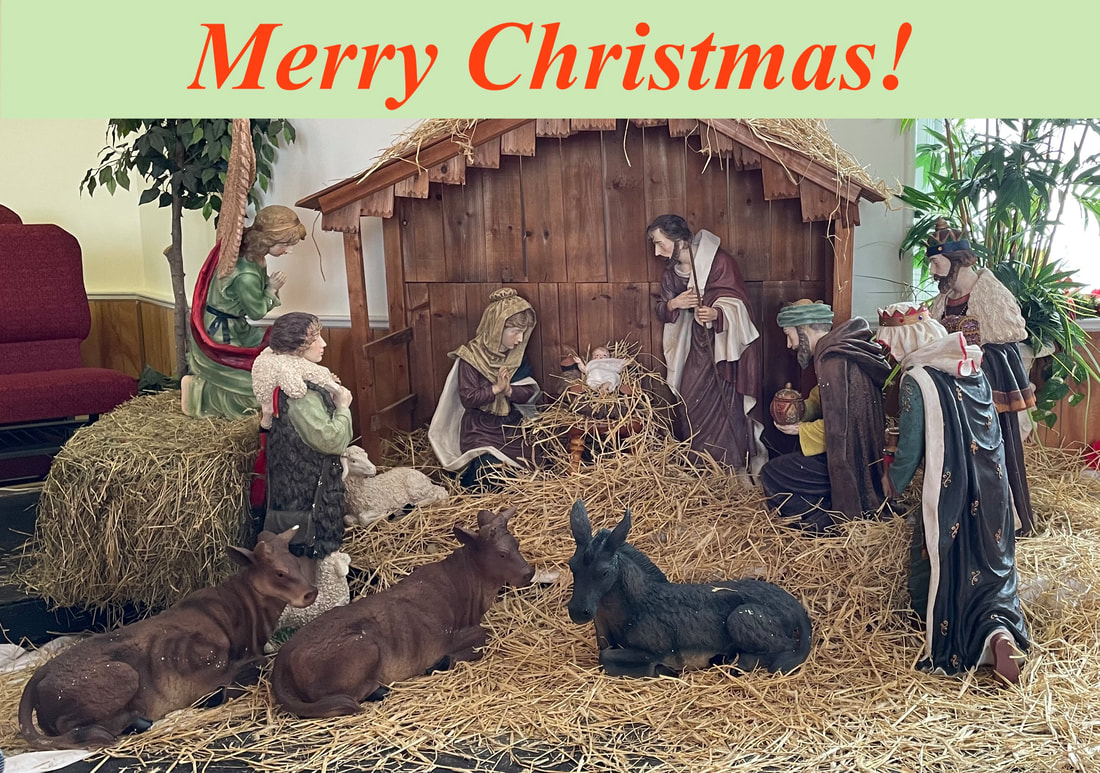
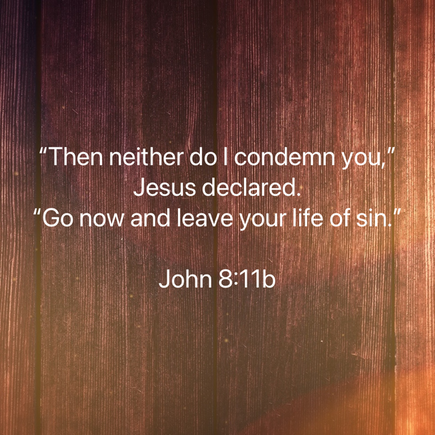
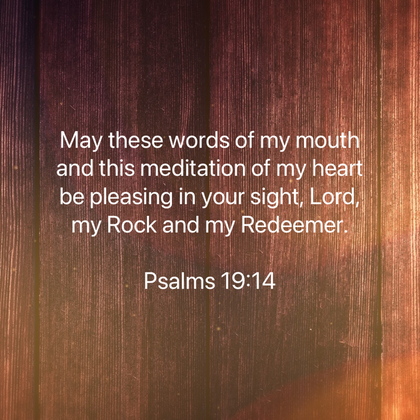
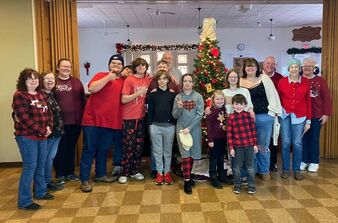

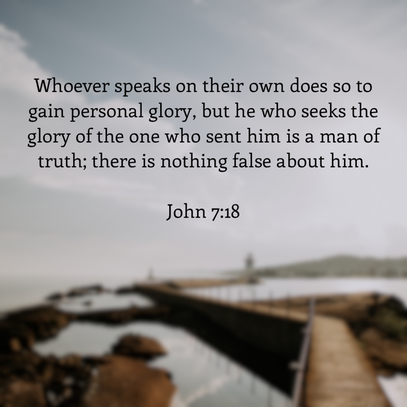
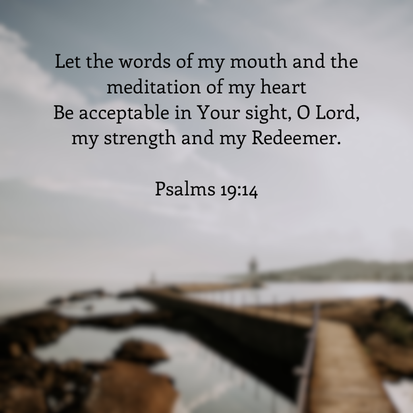
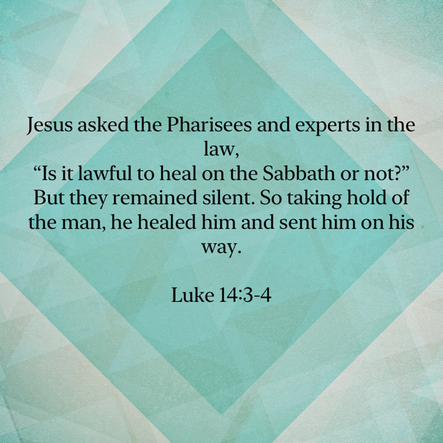
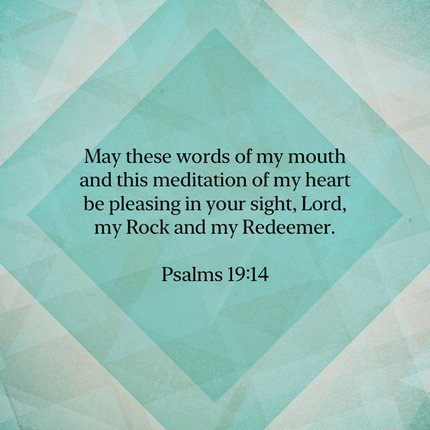
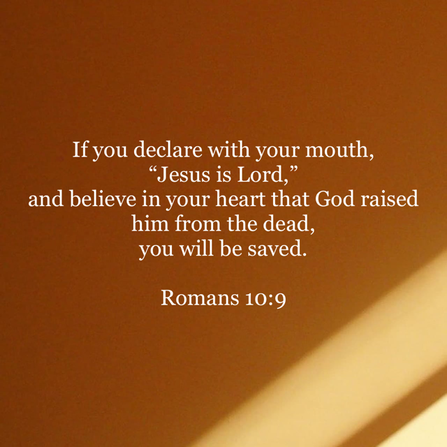
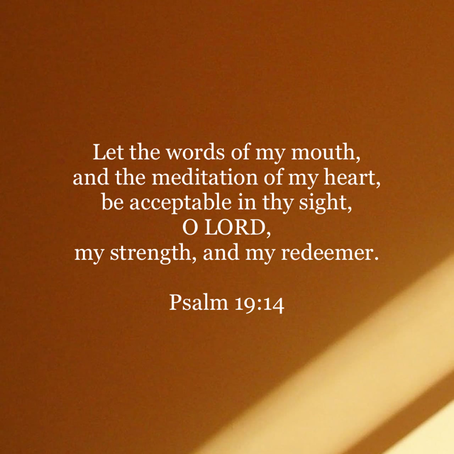

 RSS Feed
RSS Feed